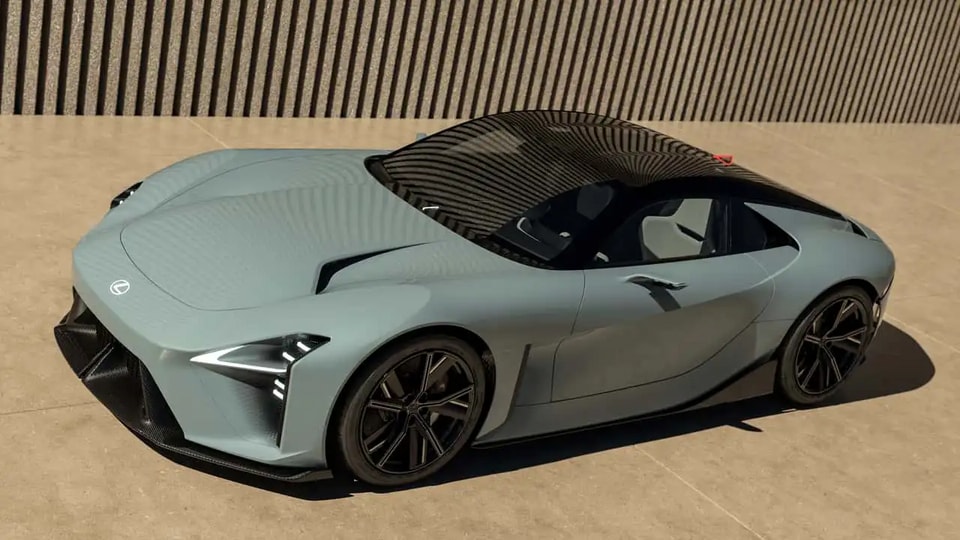Toyota GR V8 Hybrid: new twin-turbo engine confirmed
Toyota confirms twin-turbo V8 for GR supercar, hybrid but not plug-in; based on related modular engine family of 1.5-liter and 2.0-liter. Lexus will also use.
Toyota has confirmed that it is developing a twin-turbo V8 hybrid for its GR-badged supercar, which is expected to debut in early December. Speaking at the 2025 Japan Motor Show, Takashi Uehara, Toyota's Powertrain President, confirmed that the new V8 will be part of a hybrid powertrain, but not a plug-in hybrid (PHEV). He also suggested that Lexus will use an electrified variant of the same in a production sports car based on the Sport Concept.

Twin-turbo V8 on new modular platform
The technical platform for the new eight-cylinder engine is part of Toyota’s upcoming modular gasoline engine family, which is shared with the 1.5-liter and 2.0-liter versions, according to Uehara. The connection is described as “extensive,” suggesting a shared approach to components and common architecture, which helps optimize development costs and the ability to customize for performance applications.
In the mid-engined GR Yaris M concept, the 2.0-liter G20E engine in the same family is targeted to produce more than 400 horsepower. The twin-turbo V8 promises to go beyond that thanks to four additional cylinders and a second turbocharger, but Toyota hasn't released specific figures.
Hybrid but not plug-in: performance goals and compliance
Uehara confirmed that the powertrain will be a hybrid rather than a PHEV. This approach fits the weight and performance targets of a GT3-based car, while also helping meet increasingly stringent emissions requirements. Toyota hasn’t shared details about the motor layout, battery, or driving strategy; those details will become clearer when the car is unveiled.
Lexus will use an electrified V8 variant
Responding to a question about Lexus’s access, Mr. Uehara suggested that the luxury brand would use a new hybrid V8 engine in a sports car based on the Sport Concept. He also hinted at two different modifications: a “more gentle character” that fits the Lexus spirit, and a “muscular, heavy-duty” configuration for the flagship GR model as well as the track scene.
Sharing engines between multiple models makes sense cost-wise: a racing variant helps justify engineering investment, while a road-going Lexus version expands production scale, improving economics.
V8 is not over yet: the whole industry picture
Toyota isn't alone in its quest to keep the V8 alive. According to Motor1, AMG is developing a new V8; parent company Mercedes is still sticking with its V12. BMW has confirmed it's optimizing its V8 to meet upcoming emissions standards. Through Porsche, the Volkswagen Group also plans to keep its V8s around until the 2030s. In that context, the Toyota/Lexus hybrid V8 suggests a practical way forward: electrification to extend the life of high-performance engines.
The facts have been confirmed
| Category | Information |
|---|---|
| Engine | Twin-turbo V8 |
| Electrochemistry | Hybrid, not plug-in hybrid (PHEV) |
| Technical platform | Part of Toyota's new modular gasoline engine family |
| Technical related | “Broadly” related to the 2.0-liter G20E engine of the GR Yaris M concept (target > 400 hp) |
| Application products | Supercar with GR badge; Lexus sports produced from Sport Concept |
| Time | Expected to launch in early December (according to sharing at the event) |
| Information sources | Interview by Takashi Uehara at the Japan Mobile Show 2025; via CarExpert, Motor1 |
Technical perspective: why choose V8 hybrid?
From what Toyota has announced, it can be seen that the priority is on sustainable performance and compliance. The modular architecture allows for platform sharing between 1.5-liter, 2.0-liter and V8 capacities, shortening development time and ensuring system uniformity. The lack of a PHEV reduces constraints on battery mass and charging capacity, which is in line with the characteristics of a car with racing DNA.
Conclude
Toyota's confirmation puts an end to speculation: a twin-turbo hybrid V8 will power the GR supercar, paving the way for a production Lexus sports car. Details are yet to be announced, but the technical direction is clear: a modular platform, moderate electrification, and a focus on practical performance. Expect more details and a commercialization strategy in early December.


